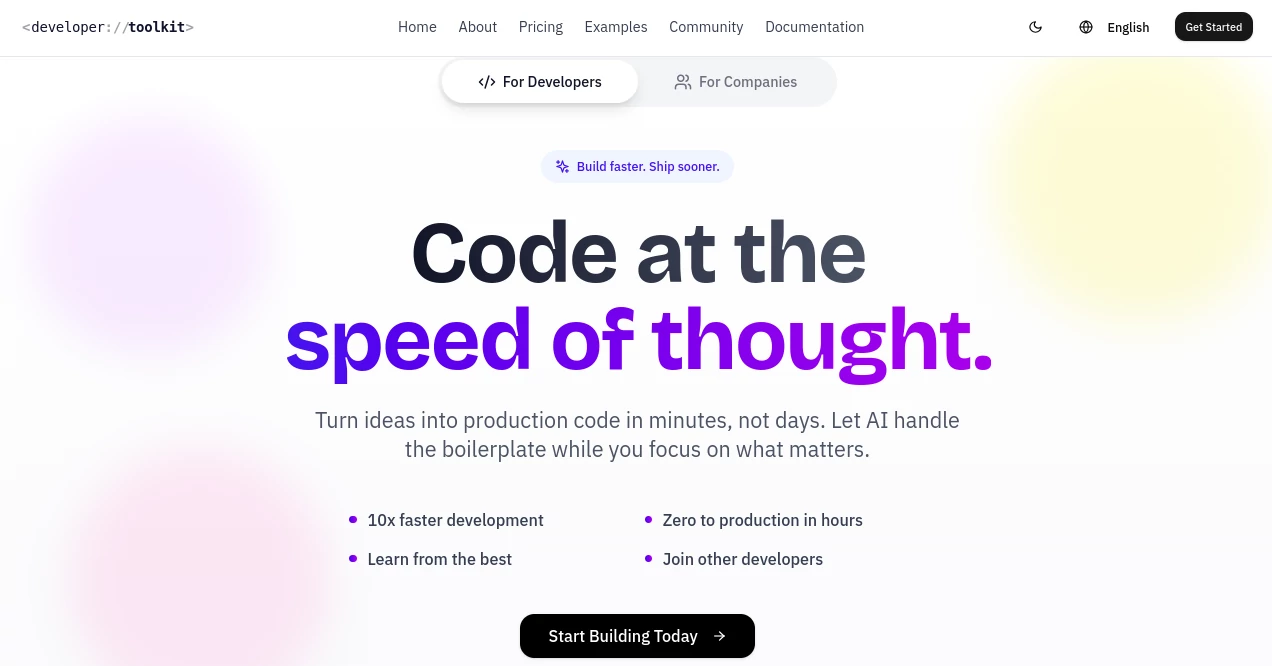🧠 AI Quiz
Think you really understand Artificial Intelligence?
Test yourself and see how well you know the world of AI.
Answer AI-related questions, compete with other users, and prove that
you’re among the best when it comes to AI knowledge.
Reach the top of our leaderboard.
Developer Toolkit AI
Accelerate Your Coding with AI Mastery

What is Developer Toolkit AI?
Developer Toolkit serves as a powerhouse for coders looking to harness the latest in smart assistance, turning rough concepts into polished programs in a fraction of the usual time. It wraps up essential guides and examples that make diving into advanced setups feel straightforward, letting you focus on innovation rather than setup snags. Seasoned builders and fresh starters alike turn to it for that edge that keeps projects moving without the drag of endless trial runs.
Introduction
Developer Toolkit burst onto the scene amid a wave of folks frustrated by the slow grind of piecing together modern codebases, especially when smart helpers promised more but delivered less. It kicked off as a curated spot to unpack tools like Cursor and Claude, drawing from real-world hustles to offer paths that actually stick. In no time, it gathered steam among indie devs and team leads who shared wins like slashing weeks off launches, crediting the clear breakdowns that bridged the gap from hype to hands-on. What keeps it buzzing is that down-to-earth approach, packing deep dives into bite-sized lessons that evolve with the fast-changing landscape of building apps.
Key Features
User Interface
Right from the jump, the layout pulls you in with a no-nonsense dashboard that spotlights key sections without burying you in clicks. Tabs for docs and samples line up neatly, expanding just enough to show previews while keeping the main view open for your notes. It's the sort of setup that clicks after a glance, with search that sifts through hundreds of entries quick as a wink, making it a breeze to hop between languages or snag a ready snippet.
Accuracy & Performance
Every tip and template rings true to life, pulled from patterns that have powered real ships, ensuring your tweaks land without wild goose chases. It hums along even when you're knee-deep in a sprint, dishing out examples that load in a flash and scale to your setup. Devs often nod to how it trims the fat from routines, freeing up cycles that used to vanish on basics, all while holding steady on the details that matter.
Capabilities
From sketching full stacks to nixing the repetitive bits, it equips you to spin ideas into working builds at a clip that feels almost unfair. With stacks of write-ups and over a hundred ready-to-run bits, it covers the sweep from quick prototypes to ironclad deploys. You can weave in fresh tricks for handling data flows or user hooks, all layered with steps that fit solo gigs or crew efforts, broadening what you can tackle without extra gear.
Security & Privacy
Your sessions stay snug, with no peeks at your private repos or shared secrets beyond what you choose to explore. It leans on standard locks for access, keeping guides and grabs contained without feeding into bigger nets. Builders appreciate the clean slate it offers, where you dip in for knowledge without leaving traces that could trip up later, fostering that quiet trust in a field full of watchful eyes.
Use Cases
Freelancers use it to mock up client mocks overnight, blending samples to match specs without starting cold. Teams loop it into standups, pulling tailored paths to onboard juniors on hot tools fast. Hobbyists tinker with side projects, grabbing bits that speed from doodle to demo. Even educators weave its threads into workshops, handing students a shortcut to grasp the nuts and bolts of smart-assisted builds.
Pros and Cons
Pros:
- Trims build times down sharp, letting you ship ideas quicker.
- Packs a library of real-world examples that actually apply.
- Feels welcoming for all levels, from green to grizzled.
- Stays fresh with updates that track the tool evolutions.
Cons:
- Assumes some base know-how to dive deepest.
- Light on hands-on practice spots within the guides.
- Growth might outpace the coverage now and then.
Pricing Plans
You can ease in with a free tier that unlocks core docs and a handful of samples, enough to test the waters without a dime. Step up to pro for about twenty bucks monthly, gaining full access to every write-up and unlimited pulls, with a yearly dip that shaves off a fifth. Teams go enterprise for custom fits around a hundred per head, tossing in dedicated chats and priority tweaks. Trials stretch two weeks to let you feel the full swing risk-free.
How to Use Developer Toolkit
Sign up quick and poke the starter guide to pick your focus, like unpacking a new helper. Scan the index for your language, grab a sample that matches your snag, and tweak it in your editor while cross-checking the steps. Build out from there, layering in advanced bits as you go, and bookmark keepers for quick recalls. Circle back to the updates feed to stay looped on fresh drops that fit your flow.
Comparison with Similar Tools
Where broad hubs scatter tips across forums, Developer Toolkit tightens the focus on proven paths, though those might offer wider chit-chat. Against raw code vaults, it adds the walkthroughs that turn grabs into gains, skipping the hunt for context. It edges ahead for targeted leaps, blending depth with speed where others sprawl or skim, ideal for devs chasing that next-level polish.
Conclusion
Developer Toolkit lights a fire under the daily dev dance, handing you the smarts to build bolder and quicker in a world that spins faster every day. It turns the maze of modern making into a marked trail, empowering you to chase the big swings without the small stumbles. As tools keep leaping ahead, this one's right there, fueling the kind of breakthroughs that redefine what's possible one line at a time.
Frequently Asked Questions (FAQ)
Does it cover my go-to language?
Starts with two mains, with more on the way as demand pulls.
How fast can I see gains?
Many spot shifts from the first session, trimming hours off habits.
Is it for teams or just solos?
Scales both ways, with shares and customs for group grooves.
What if I hit a wall?
Community threads and support lines light the next step.
Can I contribute my own tips?
Open calls welcome fresh takes to keep the pot stirring.
AI Code Assistant , AI Code Generator , AI Testing & QA , AI Developer Tools .
These classifications represent its core capabilities and areas of application. For related tools, explore the linked categories above.
Developer Toolkit AI details
This tool is no longer available on submitaitools.org; find alternatives on Alternative to Developer Toolkit AI.
Pricing
- Free
Apps
- Web Tools

















